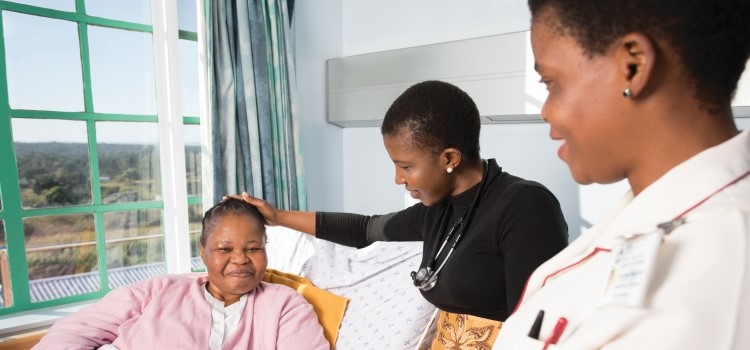How is COVID-19 affecting health science students from rural areas?

Azania Mosaka recently spoke to Gavin MacGregor, the director of the Umthombo Youth Development Foundation, about the impact the COVID-19 pandemic is having on its scholarship recipients who are studying to become healthcare professionals.
How are health science students from rural areas maintaining their studies in the face of COVID-19? To shed light on the issue, here’s Gavin MacGregor, director of the Umthombo Youth Development Foundation.
Listen to the podcast:
Training tomorrow’s health heroes
Gavin describes the purpose of the Umthombo Youth Development Foundation, which the Discovery Fund has been supporting since 2001. “Our aim is to address staff shortages at rural hospitals, specifically in KwaZulu-Natal, by identifying youth from the area who have academic potential and an interest in studying a health science degree. We give them a full bursary and mentoring support to go to university to become qualified healthcare professionals. In return for that opportunity, we expect them to go back and work at their local hospital for the same number of years that we supported them.”
“To date, we have 434 graduates covering 18 different health science disciplines and of those graduates, 155 are doctors,” he adds.
How has COVID-19 disrupted Umthombo’s work?
Gavin says before COVID-19, Umthombo students already faced significant challenges. “All our students come from no-fee, quintile one and two schools that are poorly resourced,” he says. “By the time our students come into university, they have a lot of catching up to do. Language and study skills are a problem.”
To help them develop the skills to thrive in their new academic and social environment, each student has a mentor who gives them guidance and support.
“The biggest impact of COVID-19 has been the disruption of the academic programme at universities,” Gavin says. “Our main intervention is to provide academic interim support to our students to help them navigate the university environment.”
How COVID-19 is affecting students
Gavin says the uncertainty around the pandemic is causing students much stress and anxiety. “The academic programme has just started and now it’s been disrupted. We have students who are hoping to complete their qualification this year, and now they’re not sure if that’s going to happen. That brings a lot of uncertainty.”
He explains that students may not be equipped to use online learning tools. “They’ve had to leave university residence and campus Wi-Fi and go back home,” he says. “The internet connection is poor, data is expensive, and most of them don’t have resources like laptops to access the material. They have to learn how to use a particular program first before they can even start learning the content that they’re supposed to be accessing.”
Gavin says while universities are making sure students can download relevant learning programs for free, they still need to access the internet to supplement their learning, which costs money. “And then there’s also the cost of communication when a student might need to speak to a mentor. All of these factors are now working against them.”
How will COVID-19 change Umthombo?
“Our students are on 16 different campuses and we have local mentors situated close to or on those campuses, so we’ve always been able to provide the same level of support to all students,” he says.
The challenge now is how to keep contact without physical meetings. “We’ve been doing this for 20 years and we certainly feel that face-to-face interaction is a valuable way to mentor students, but down the line we may have to look at online meetings rather than sitting across a table from each other.”
Gavin says digital literacy is crucial for students. “We will need to orientate our students around using technology more. Most rural students, by the time they get to university, would not have touched a computer and they have to catch up because by the end of the first semester they’re supposed to be submitting their assignments online. That was the norm before, but COVID-19 has sped everything up.”
“Those are the kind of things we’ll need to look at to support students so that they are better equipped to deal with a very big hiccough like this pandemic,” he adds.
Umthombo graduates on the frontline
Many of Umthombo’s graduates are part of the fight against COVID-19. “Some of our doctors working in rural areas are concerned that people haven’t been obeying the stay-at-home regulations and so, many of them have been using their expertise to try and educate their community to make sure that they do take this seriously,” Gavin says.
“These young people who are now working on the frontline are going to make a critical impact in keeping everyone safe,” Gavin concludes. “We can be thankful that we have competent healthcare workers who are willing to protect us all.”
Listen to the interview with Gavin MacGregor to find out more about the Umthombo Youth Development Foundation. Listen to more of our COVID-19 podcasts for added insights into managing your life in the context of COVID-19. Stay informed. Stay healthy.
ALL MEDICAL INFORMATION FOUND ON THIS WEBSITE INCLUDING CONTENT, GRAPHICS AND IMAGES, IS FOR EDUCATIONAL AND INFORMATIONAL OBJECTIVES ONLY. DISCOVERY HEALTH PUBLISHES THIS CONTENT TO HELP TO PROTECT AND EMPOWER ALL SOUTH AFRICANS BY PROMOTING A BETTER UNDERSTANDING OF COVID-19.
Find a healthcare professional near you
Find a doctor or hospital near you online or by using the Discovery app.
Related articles

Outbreak of the 2019 novel coronavirus
The 2019 novel coronavirus (2019-nCoV) has caused an outbreak of fatal respiratory illness first detected in Wuhan, China. This is a completely new strain with no vaccines available. The best way to prevent infection is to avoid being exposed to this virus.

Understand the Novel Coronavirus (COVID-19) and prevent infection
No country is immune to the spread of the Novel Coronavirus - officially named COVID-19 by the World Health Organization (WHO). The outbreak has reached pandemic proportions and been declared a global public health emergency.

Novel Coronavirus - wash your hands of the threat
As toddlers, we learnt to wash our hands. But, did we ever master the skill to the extent that is needed to wash pathogens off our hands, and save lives? Multiple studies show people don't wash their hands at the right times, in the right way or for the right amount of time. We contaminate the things and people we touch with the germs we carry on our hands.